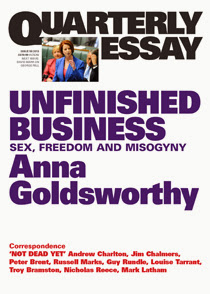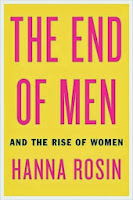After finishing David Marr’s Quarterly
Essay on George Pell (QE 51
- September 2013), I went searching for the previous edition. Titled Unfinished Business – Sex, Freedom and
Misogyny, writer Anna Goldsworthy explores the modern world for women in Quarterly Essay (QE50, June 2013).
Starting with Prime Minister
Gillard’s famous speech from October 2012, when she passionately exclaimed that
“I will not be lectured about sexism and misogyny by this man” in reference to
then opposition leader Tony Abbott. The speech reverberated around the globe as
she spelled out how she was offended by Abbott’s continual sexist attacks.
With over 2 million views on YouTube, Gillard’s speech was spoken about in
office corridors and homes, as she vocalised what many girls and women had felt
but never voiced.
Goldsworthy uses Gillard’s speech
as a springboard to talk about what it means to be a woman in modern Australia.
At the time of publication, Gillard was Prime Minister, a female Governor
General, a female Speaker in parliament, and a large number of talented women
on the front bench. So it would seem that Australian women are in a remarkable
position. However, now a mere five months later, Abbott is in government with only one woman
in his cabinet. It is small concession that he has appointed a woman as
Speaker. Women have been back-benched and sidelined.
Over the course of the essay
Goldsworthy issues four cautionary tales: the politician (Gillard), the miner
(Gina Rinehart), the scholar (Mary Beard) and the novelist (Hilary Mantel). She
then turns to popular culture (Mad Men,
59 Shades of Grey, Twilight, Girls, Lady Gaga) and what this tells us about
women. She talks about shame and subjectivity, the narcissism of the Facebook
age, and about the increasing violence in gonzo porn. Goldsworthy questions what world our daughters will grow up in, where they are subjectively judged and held up to unrealistic and unattainable standards of what it means to be a woman.
As a feminist keenly attuned to the
issues in this essay, I found Goldsworthy’s article an interesting and
important read. I had wanted and expected it to be more about politics,
however, and the arguments she made would have benefited from contributions from
some of the other women in Parliament – such as the so-called ‘handbag hit
squad’ of women on Gillard’s front bench about allegations of 'playing the gender card'. This was a missed opportunity. While
I didn’t agree with everything Goldsworthy had to say, I enjoyed her
perspective and her contribution to this necessary discussion.













